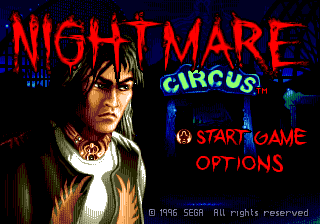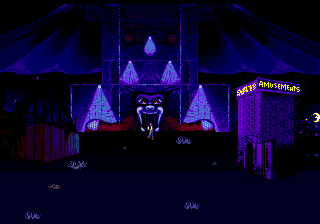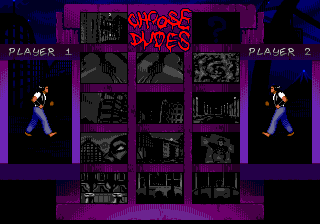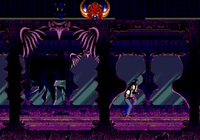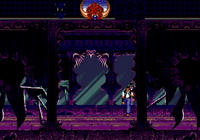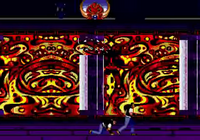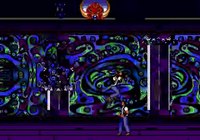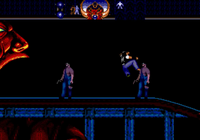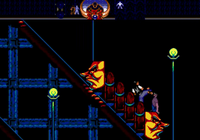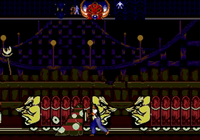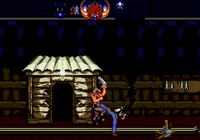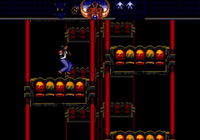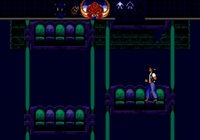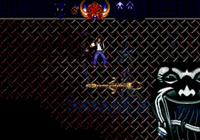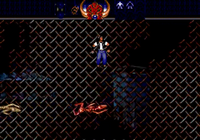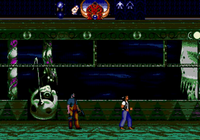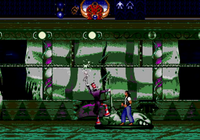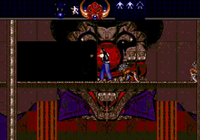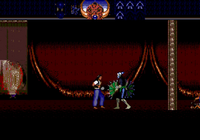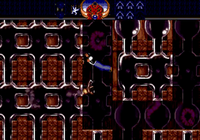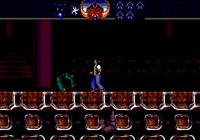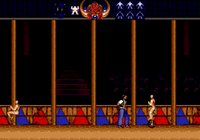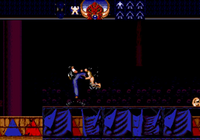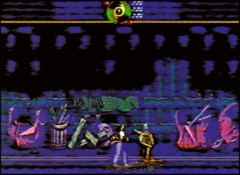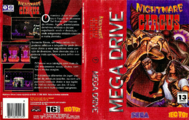Nightmare Circus
From Sega Retro
| Nightmare Circus | ||||||||||||||||||||
|---|---|---|---|---|---|---|---|---|---|---|---|---|---|---|---|---|---|---|---|---|
| System(s): Sega Mega Drive | ||||||||||||||||||||
| Publisher: Sega[1] (US), Tec Toy (Brazil) | ||||||||||||||||||||
| Developer: Funcom[2][3] | ||||||||||||||||||||
| Sound driver: GEMS | ||||||||||||||||||||
| Peripherals supported: Six Button Control Pad[4] | ||||||||||||||||||||
| Genre: Action | ||||||||||||||||||||
| Number of players: 1-2[5] | ||||||||||||||||||||
| Official in-game languages: | ||||||||||||||||||||
|
Nightmare Circus is a Sega Mega Drive action beat-'em-up game developed by Funcom.[2][9][1] Beginning as an experiment by Sega of America to finish a game's design before development had even begun[10], it was originally scheduled for a North American release in Autumn 1995[11] (later pushed back to December 1995[12], and then again to April 1996[13]), but issues during development and the dwindling lifespan of the Genesis resulted in Sega backing out of the project. While left unfinished from a design standpoint, the game was stable enough on a programming level to be technically completable; eventually it was picked up for the Brazilian market by Tec Toy and saw an official boxed release there in June 1996. Six months later, Nightmare Circus did eventually see a North American release, broadcast via Sega Channel[14][15] in both the United States[7] and United Kingdom[8] as one of the system's more notable downloadable exclusives.
Boasting a complete lack of player direction or any indication on how to proceed, a highly complex but largely unexplained control scheme, and a notable amount of unfinished content, Nightmare Circus has become known for its modern reputation as one of the worst video games ever released. However, it also boasts a significant amount of well-considered features and a level of very visible passion that, while presented with striking inconsistency, instead notions its faults to the result of a development cycle cut short[16] - and the subsequent commercial release of a game that was almost-but not quite finished.
Contents
Story
| “ | When the Circo del Diablo first began setting up its tents on the edge of the city, people began to gather to purchase tickets for its opening night.
|
„ |
— BR manual[17] | ||
Gameplay
Raven enters the Nightmare Circus seeking revenge for the death of his parents, and to free the souls captured by the Jester. Players begin outside the circus' three available areas (with the fourth, the main circus tent, initially locked), and are able to choose which to tackle first. By fighting their way through an area and defeating its boss, players can acquire that boss' special ability for use in the next area. When at least one of these areas is completed, the final stage is unlocked, with players able to bypass the remaining stages and proceed directly to the game's conclusion at their discretion.
Free to explore the carnival at will, Nightmare Circus presents nothing in the way of direction during gameplay, and players are left to creatively interpret the game’s visual cues to proceed. While some stages are relatively straightforward, others can only be completed by more obtuse methods, with the game as a whole featuring little player feedback to indicate progression. Fortunately, Nightmare Circus autosaves player progress, including which stages have been cleared, which bosses have been defeated, and which special abilities have been acquired.
Mechanics
As a Native American shaman warrior[17] hailing from the state of Arizona[18], Raven boasts an extensive repertoire of both physical (C-PSI) and psionic (I-PSI) attacks. When attacking, striking with the most extended point of the animation - like the end of Raven's shoe while kicking - results in more damage dealt, discouraging players from fighting up close. Using psionic abilities drains Raven's I-PSI meter, which can be refilled by grabbing the souls which escape defeated enemies.[19] Raven can also expend I-PSI to heal himself with MODE +![]() [19], and can capture the special abilities of defeated bosses with
[19], and can capture the special abilities of defeated bosses with ![]() .[20] However, only one special ability can be held at a time.
.[20] However, only one special ability can be held at a time.
Raven is able to enter Spirit Warrior Mode, in which his attacks drain enemy I-PSI instead of C-PSI. As bosses are able to rapidly heal themselves, the game encourages (and sometimes requires) that players drain bosses' I-PSI before they can be realistically defeated. This attack will also defeat most regularly enemies entirely, but does not spawn a soul. Raven can also perform the exclusive Spirit Warrior Projectile attack in this mode.
Nightmare Circus features a difficulty scaling system which multiplies the damage and stun values used by enemy attacks, as well as Spirit Warrior Projectile damage. Scaling begins at 100% and increases with every new stage completed. On the second and third stage, attack values are doubled to 200%, and on the fourth and fifth stage they are tripled to 300%. On the sixth stage (the point at which players could have ended the game but instead opt to complete all stages), the scaling is reduced to 200%, with the seventh and final stage returning to the starting point of 100%.
HUD
Raven's health (C-PSI) is represented by the interior of the crouching red figure, and his psionic power (I-PSI) by the figure's blue, oval-shaped background. The sphere held in the figure's hand lights up to indicate Spirit Warrior mode is active. Special abilities appear as small human silhouettes to the left of the red figure, and extra I-PSI reserves on its right. The many empty spaces on the left side of the HUD are reserved for on-screen enemies, with each represented by a blue sphere which dims as that enemy loses health.[21] When a second player is active as White Eagle, a second HUD appears.
Game modes
- 1 Player: Raven fights through Nightmare Circus alone.
- 2 Player Cooperative: Raven and his twin brother White Eagle[22] fight through Nightmare Circus together, and are able to perform exclusive combination attacks. This mode doubles enemy health and spawns an additional pair of minibosses. If either player dies, the game returns to single-player mode and the living player is allowed to continue.
- 2 Player: The first player controls Raven, while the other controls on-screen enemies (with the ability to select from and spawn additional enemies.[22]) The first player tries to play the game as normal, while the second player tries to kill the other. MODE +
 , MODE +
, MODE + , and MODE +
, and MODE + select between enemy types, while MODE +
select between enemy types, while MODE + and MODE +
and MODE + select between different enemies in that type.
select between different enemies in that type. - 1 on 1 Combat: A one-stage deathmatch between either two human players, or one player and the computer, with combatants able to select from either Raven, White Eagle, or any of the game's bosses. Once a stage is cleared in any other game mode, it becomes selectable for 1 on 1 Combat. Additionally, defeating a boss and acquiring its special ability unlocks that ability's use in 1 on 1 Combat, with fighters allowed to choose from a single I-PSI ability each match.[22]
Abilities
| Raven / White Eagle | ||||||||||||||||||||||||||||||||||||||||||||||||||||||||||||||||||||||||||||||||||||||||||||||||||||||||||||
|---|---|---|---|---|---|---|---|---|---|---|---|---|---|---|---|---|---|---|---|---|---|---|---|---|---|---|---|---|---|---|---|---|---|---|---|---|---|---|---|---|---|---|---|---|---|---|---|---|---|---|---|---|---|---|---|---|---|---|---|---|---|---|---|---|---|---|---|---|---|---|---|---|---|---|---|---|---|---|---|---|---|---|---|---|---|---|---|---|---|---|---|---|---|---|---|---|---|---|---|---|---|---|---|---|---|---|---|---|
|
C-PSI: 2000 I-PSI: 1000 Power: 88 | ||||||||||||||||||||||||||||||||||||||||||||||||||||||||||||||||||||||||||||||||||||||||||||||||||||||||||||
| Raven, the game's protagonist, is able to utilize a large number of both corporeal (C-PSI) and incorporeal (I-PSI) abilities. Incorporeal abilities drain the I-PSI meter, which initially has a maximum of 1000 I-PSI. Raven's attacks will slowly change in color as this meter is depleted.[23] Defeating a boss permanently expands the I-PSI meter by an additional 1000.[20]. The C-PSI meter is permanently capped at 2000 health.
|
Stages
Players begin outside many of the carnival's various attractions, able to choose which of the three available stages to tackle first: Amusements, Roller Coaster, or Rides. The Amusements stage is accessed through the "Amusements" building, the Roller Coaster stage is accessed through the rollercoaster at the left, and the Rides stage is accessed through the ferris wheel at the right.
When one of these areas is completed, the final stage, Circus, becomes accessible through the big top tent at the carnival's rear. While the game encourages completion of the remaining two optional areas, players are free to proceed directly to Circus at their discretion - concluding in a fight with Jester for the fate of the ghostly carnival.
Amusements
| House of Fun | |
|---|---|
| A funhouse-like maze of connecting rooms designed in a three-dimensional space. Players can turn themselves to a new cardinal direction by running to the edge of the screen, climb ladders to ascend to the upper floor, or enter trapdoors to descend to the lower floor. Different rooms feature distinct gimmicks, like one which swings back and forth while players are inside, and additional passageways can be revealed by attacking parts of the maze's walls. | |
| Hall of Mirrors | |
| A long hallway lined with mirrors where players encounters a large number of Looking Glass Men, duplicate images of Raven who step out of the mirror to fight him. | |
| Kaleidoscope | |
|
Boss: Doppelganger | |
| A psychedelic rotating cylinder which holds a series of four rotating crystals that appear to be pushing the room around; so large that the crystals must be crawled under to proceed. Destroying these crystals (and fighting off the oncoming waves of Looking Glass Men) results in players being able to damage the stage boss Doppelganger, a powerful Looking Glass Man with the ability to spawn more of his kind through his special Clone ability. |
Roller Coaster
| Roller Coaster | |
|---|---|
| A large roller coaster stage in which players can either run around the tracks on foot, or hop in one of the passing rollercoaster trains. Large levers placed along the tracks can be kicked to change the direction of incoming trains. Thankfully, the trains cannot damage players while rolling by. Riding a specific train into the lower-left of the stage will carry players into the Work Yard. | |
| Work Yard | |
|
Boss: Chainsaw | |
| A maintenance area for the roller coaster trains. Players spawn in front of a train buffer stop which he can push forward to shield him from the flurry of sawblades thrown from the offscreen Wooden Man enemy. After following the tracks to a decrepit workshed, players encounter the area's boss, Chainsaw: a large, muscular man wearing a Jason Vorhees-esque mask and wielding a chainsaw. When first encountered, he is performing his Animate ability to possess a nearby Wooden Man enemy and will be unable to move for the beginning of the fight. The left edge of the area can be used to corner Chainsaw into repeated stun attacks.[27] |
Rides
| Twin Wheels | |
|---|---|
| A pair of ferris wheels placed beside each other, facing the camera and traveling in opposite directions. Their gondolas can be jumped on and ridden, but deadly fire at the bottom of each wheel ensures players cannot stand still for too long. While keeping themselves from getting close to the bottoms of the wheels, players must contend with ghostly Roadies attempting to push them off the gondolas. After enough enemies have been killed the fire at the bottom of the wheels extinguishes, allowing players to safely drop to the floor and exit the stage. | |
| Wall of Death | |
| A dilapidated rotating centrifuge ride constructed of chainlink fence and rotting wood which pushes players to its walls when it spins. Skinless dogs known as Crawlers patrol the fence, and are able to attack players while the ride is spinning. Hitting the switch on one of the ride's metallic clown doors stops the ride and allows players to enter the door. | |
| Dodgems Rink | |
|
Boss: Helter Skelter | |
| A decrepit bumper car rink with a dark, sickly mood. The stage itself is fairly open and straightforward, pitting oncoming waves of Roadies against players in a test of endurance. Surviving this spawns the boss, a magician named Helter Skelter with the ability to telekinetically propel the stage's old bumper cars into players. A magician wearing a purple suit, wielding a magician's cane, and able to throw electric projectiles, Skelter uses the special ability Haste - allowing users to greatly increase their animation speed and movement. |
Circus
| The Ticket Office | |
|---|---|
|
Boss: Ying Yang Brothers | |
| Players begin The Ticket Office standing before long metal ladder, which reveals the stage to be a massive wooden billboard featuring decrepit clown artwork, with multiple scaffolds across its face. The billboard is comprised of numerous wooden panels which can be destroyed by performing an Elbow Spin (
| |
| Maggot-Men Act | |
|
Boss: Hydra | |
| Maggot-Men Act opens with players strapped to circular wooden wheels in a claustrophobic wooden laboratory for a knife-tossing minigame, where the objective is to spin the wheel so that the knives avoid their bodies. After avoiding enough knives, players fall off the wheel and begins the stage proper - a massive wood-glass laboratory where the floors, walls, and ceilings are constructed entirely from a maze of interconnected glass vials. In this maze are wriggling grubs crawling between vials. As these vials are inconsistently connected to one another, grubs will constantly attack from unexpected places. The background layer consists of a second vial maze connected to the first, forcing players to keep track of a number of variables to survive. With no safe place to remain still, every movement must be timed so that players don't encounter a passing grub.
| |
| Body Snatching Act | |
|
Boss: Body Snatcher | |
| A trapeze set on the main floor of the big top, in front of what appears to be an actual audience. There are clay-like enemies called Morphs which must be defeated to proceed, and which come in different varieties: some trapeze, some walk tightropes, and others juggle. Players can also properly trapeze with much of the stage's environment, something required for reaching and defeating all but one of the stage's Morph enemies. Only then can the stage boss, Body Snatcher, be fought properly. Due to the specific nature of Morph enemies to return to life dependent on its remaining I-PSI, the use of Spirit Gate Mode is highly recommended.
| |
| Final Act | |
|
Boss: Jester | |
| The final stage is a fight with Jester, a three horned demon which appears on the game's box art. Fought in a red-tinted version of the circus' big top, Jester's resembles traditional Christian depictions of the devil, and is the final boss of Nightmare Circus. His special ability is Transform, where he is able to morph into previous bosses during the fight. He has an enormous I-PSI pool, and features even more I-PSI the more players have died over the course of the game. Defeating Jester causes hell to open and pull him back in, completing the game. |
Enemies
| Roadie | |
|---|---|
| A common humanoid enemy wearing blue overalls and wielding a nailgun. While the damage dealt from its nailgun is relatively weak, it will attempt to strike players with a hammer when close. | |
| Wooden Man | |
| A wooden robot only encountered in Work Yard, it has the ability to hurl powerful sawblades at players from a great distance. Players are encouraged to push the nearby train buffer stop towards Wooden Man to block his sawblades during their approach. | |
| Jack in the Floor | |
| A weak jack in the box-type enemy bearing sharp teeth which frequently appears from the floor to bite at players. A variation called the Tumbling Jack has the ability to scale walls. | |
| Toy Cannon | |
| A weak miniature toy cannon which fire cannonballs at players. | |
| Zeppelin | |
| A miniature toy zeppelin which drops weak bombs on players. Getting caught in its propellor causes significantly more damage. | |
| Looking Glass Man | |
| A mirror image of the player, able to perform many of the same attacks. Appears exclusively in Hall of Mirrors and Kaleidoscope, and while weak and easily dispatched, their large numbers can quickly overwhelm players. | |
| Crawler | |
| A demonic, emaciated dog found exclusively in Wall of Death, where it aggressively crawls along the mesh fencing of the spinning wheel. A skinless, more aggressive variation called the Nasty Crawler is encountered on later trips to the area. | |
| Warrior Puppet | |
| A highly-animated marionette of a tribal warrior with the ability to "fly" around the stage. Although not overly powerful, their small size and fast speed make them particularly challenging enemies, especially when presented in pairs. | |
| Maggot Man | |
| A large grub-like maggot described as a "man". Appearing exclusively in Maggot-Men Act, it plays into the stage's unique gimmick of being constructed from interconnected glass vials. Large numbers of Maggot Men randomly crawl between the vials, and have the ability to leap out and bite at players from virtually any floor, ceiling, or wall. While they can be defeated, the stage encourages players to proceed as fast as possible to avoid their bites. | |
| Morph | |
| A featureless, clay-like circus performer appearing exclusively in Body Snatching Act. Morphs are immune to damage while performing a circus routine, and can be defeated by being knocked down with a single strong attack. It then curls into a ball for a brief period of time, and dependent on its remaining I-PSI, will either return to life or be permanently defeated. Spirit Gate Mode is recommended for dealing with Morphs. |
Tweaker
- Main article: Nightmare Circus/Tweaker.
Locked behind the password screen is the Tweaker, an extensive debug menu that allows minute alterations to things like hitboxes, variables, and even the game’s gravity - the physical range of attacks can be extended, for example, or the capacity of his PSI meter increased. Entering a second password additionally expands this menu with a level select. Accessing the Tweaker again during gameplay will display an additional list of variables specific to the stage being played, so enemies and obstacles can have their variables adjusted at any time the player chooses. The manual even offers potential ideas for players to alter gameplay, stating “the possibilities are nearly endless.”[29]
History
Development
- Main article: Nightmare Circus/Development.
Sometime around mid to late 1994, Sega of America decided to undertake an experiment in which the company would fully complete the design and planning for a Mega Drive game before programming had even begun. To this end, the company assembled a 1000-page document for an ambitious action-platformer titled Nightmare Circus, and assigned the Swedish video game developer Funcom to the project.[10] Experiencing a number of development issues and visible delays, it was eventually released in an unfinished state, and has resulted in the game's development becoming a curiosity among the larger gaming community.
Prerelease
When reviewed in the December 1995 issue of Next Generation, the magazine was sent an early review copy of the game, featuring drastic graphical differences from the final game - particularly in regards to the HUD, which was completely redesigned for launch.[30]
Release
Alongside its Brazilian physical release, Nightmare Circus was broadcast twice to Sega Channel subscribers in both the United States and United Kingdom. American subscribers received earlier access to the game, first broadcast over the month of December 1996.[7] It wouldn't be until halfway through 1997 that Nightmare Circus was broadcast again, this time to both the US and UK.[6][8]
Sega Channel broadcast schedule
| Region | Start date | End date |
|---|---|---|
| US | 1996-12-01 | 1997-01-01[7] |
| 1997-05-23 | 1997-06-05[6] | |
| UK | 1997-05-01 | 1997-06-01[8] |
| 1997-07-01 | 1997-08-01[8] |
Legacy
| “ | Nightmare Circus is not one of the best platform games on the Mega Drive. With bad controls and stages with confusing layouts, this is a game that should have "stayed in the oven" longer, so that the good ideas had been better executed. However, it is worth the curiosity that the cartridge version is exclusive to us Brazilians. | „ |
— Blog TecToy[18] | ||
Despite its overwhelmingly negative associations, both Nightmare Circus's graphics and animations were moderately well-received among the gaming public, as was the game's dark, GEMS soundtrack.[18]
While Nightmare Circus is completeable once its peculiarities have been overcome, the lack of player direction is so severe that the larger gaming community was unaware of how to even reliably beat the game. However, in late 2009 YouTube user RendMGaming uploaded a five-part tool-assisted speedrun demonstrating the game’s completion[31], providing valuable insight into Nightmare Circus' gameplay progression and attracting some minor interest from the modern gaming community.
Production credits
- Producer: Max Taylor
- Designer: Ricardo Pinto[32]
- Lead Programmer: Johan Andersson
- Lead Artist: Lars P. Anfinssen
- Asst. Producers: Dante Andersson, Trond W. Larsen
- Programmers: Martin Gram, Carsten Sørensen, Morten B. Ofstad
- Engine Programmers: Morten B. Ofstad, Carl Skârstedt
- Graphics Concepts: James Worall
- Artists: Torkell Bernsen, Colin McMahon, Tom Gjerde, Mikael Noguchi, Ernie Deakyne
- Music: Kurt Harland, Jim Hedges, Andy Armer
- Sound Effects: Kurt Harland, Brian Coburn, Kim Jensen
- Level Editor: Gard E. Rødahl
- Game Tweakers: Joel Breton, Ernie Deakyne, Ron Allen, Joe Cecchin, Marcus Montgomery
- Lead Tester: Joel Breton
- Asst. Lead Testers: Ernie Deakyne, Joe Cecchin, Tim Hess, Marcus Montgomery, Billy Martorana, Ron Allen
- Testers: Jack Amato, Alfred Dutton, Kim Rogers, Rick Greer, Jason Deguzman, John Amirkhan, Ed Ramirez, Tony Ciardella, Donovan Soto, Sherry Blevins, Kemrexx George, Chris Sur, Scott Crisostomo, Daniel Tyrell, Kenny Robinson, Bine Arceo, David Wood, Chris Lucich, Mark Griffin, Jeff Loney, Lance Nelson, Don Carmichael, Dermott Lyons, Mark Subotnick, Dave Paniagua, Joe Cain, Mark Paniagua, Joe Damon, Rob Prideaux, Maya De Campos, Sean Doidge, Jeremy Campbell, Jeremy Caine, Tai Huynh, Alex Barrerio, Jeff Silveira, Rolef Conlan, Matt Clerici, Anthony Desantis, Chris Johnson, Michael Ironside, Dave Asgharzadeh, Michael Douglas, Nathan Tan, Jeremy Wheat, The Big Top Mice, Zenon Thornton, Robbie Pasquini, Deserae Shanklin, Chris Baetz, Chris Cates, Charles Delay, Conner Morlang, Geoff Jones, Martin Broenkow, Roger Sommerville, George Sandoval, Ovanji Powell, Kenneth Chan, Tomothy McKnew, Christina Hurley, Six Button Bill, Toad Slepian, Sally Perlman, Joann Eastman, Pat Walsh, Phil Gamble, Geoffrey Meyers, Demian Kato, Andrew J Nolley, Darren Nagtalon, Abe Navarro
- Tools Programmers: Blue House Prod., Morten B Ofstad, Andre Johansen, Svein Aandahl, Eivind Eklund, Jesper Hansen
- Product Managers: John Garner, Bill Onderdonk
- Comic Liaison: Jennifer Hunn
- Production Asst.: Tormod Mansaker, Christian Almskog
- Special Thanks: Erik Gloersen, Jack Kristoffersen, Tommy Svensson, Joachim Barrum, Mark Miller, Terry Tang, Suzie Greene, Joyce Takakura, Larry Loth, Camp Winnarainbow
Magazine articles
- Main article: Nightmare Circus/Magazine articles.
Artwork
Physical scans
| Sega Retro Average | ||||||||||||||
|---|---|---|---|---|---|---|---|---|---|---|---|---|---|---|
|
| 65 | |
|---|---|
| Based on 2 reviews | |
Technical information
- Main article: Nightmare Circus/Technical information.
External links
- Official website (1997) (Archived)
- Nightmare Circus fansite at The Prison in Galápagos (Japanese)
- Nightmare Circus: Get to know the game that was only released on cartridge by Tectoy article at Blog TecToy (Archived; Portuguese)
References
- ↑ 1.0 1.1 http://www.funcom.com/corporate/published/nightmare.html (Wayback Machine: 2000-08-18 05:47)
- ↑ 2.0 2.1 http://www.funcom.com/corporate/games.html (Wayback Machine: 1998-01-19 22:00)
- ↑ https://www.funcom.com/about-us/
- ↑ File:Nightmarecircus md br manual.pdf, page 7
- ↑ File:NightmareCircus MD BR Box.jpg
- ↑ 6.0 6.1 6.2 http://www.sega.com/channel/now/4.html (Wayback Machine: 1997-06-05 18:45)
- ↑ 7.0 7.1 7.2 7.3 Sega Channel schedule (US; 1994-06-01)
- ↑ 8.0 8.1 8.2 8.3 8.4 Sega Channel UK schedule
- ↑ http://www.funcom.com/corporate/nightmare.html (Wayback Machine: 1998-01-19 23:05)
- ↑ 10.0 10.1 File:HistoriemOmSega2 SE Book.pdf
- ↑ 1995 Sega Product Catalog (US), page 38
- ↑ Sega Visions, "September 1995" (US; 1995-xx-xx), page 100
- ↑ Sega FY 1997 Brand Review, page 103
- ↑ http://www.sega.com/channel/now/4.html (Wayback Machine: 1997-06-05 18:45)
- ↑ Sega Channel
- ↑ https://nightmarecircus.proboards.com/thread/2/end (Wayback Machine: 2022-01-08 08:45)
- ↑ 17.0 17.1 File:Nightmarecircus md br manual.pdf, page 5
- ↑ 18.0 18.1 18.2 https://blogtectoy.com.br/nightmare-circus-conheca-o-jogo-que-so-foi-lancado-em-cartucho-pela-tectoy/ (Wayback Machine: 2021-09-04 03:26)
- ↑ 19.0 19.1 File:Nightmarecircus md br manual.pdf, page 12
- ↑ 20.0 20.1 File:Nightmarecircus md br manual.pdf, page 13
- ↑ File:Nightmarecircus me br manual.pdf, page 14
- ↑ 22.0 22.1 22.2 File:Nightmarecircus md br manual.pdf, page 11
- ↑ 23.0 23.1 File:Nightmarecircus md br manual.pdf, page page=14
- ↑ https://nitta.sakura.ne.jp/brazil/circus/circus-chapter4.html
- ↑ 25.0 25.1 File:Nightmarecircus md br manual.pdf, page 10
- ↑ File:Nightmarecircus md br manual.pdf, page 9
- ↑ 27.0 27.1 27.2 27.3 https://www.speedrun.com/nightmare_circus/guide/4pv8m#ch1The_Tweaker
- ↑ https://www.speedrun.com/nightmare_circus/guide/4pv8m#ch3Useful_Moves
- ↑ File:Nightmarecircus_md_br_manual.pdf, page 15
- ↑ Next Generation, "December 1995" (US; 1995-11-21), page 159-160
- ↑ https://www.youtube.com/watch?v=sHTfV6e_hXE
- ↑ http://www.angusm.demon.co.uk/AGDB/DBA1/Cyberco3.html (Wayback Machine: 2020-01-15 05:23)
- ↑ 1700 igr dlya Sega, "" (RU; 2001-xx-xx), page 211
- ↑ Tricks 16 bit, "Tricks Sega Gold 800 igr" (RU; 1998-03-20), page 130
| Nightmare Circus | |
|---|---|
|
Main page | Hidden content | Bugs | Development | Magazine articles | Reception | Region coding | Technical information | |
- Six Button Control Pad-compatible games
- 1-2 player games
- US Mega Drive games
- All US games
- US Sega Channel games
- UK Mega Drive games
- All UK games
- BR Mega Drive games
- All BR games
- Mega Drive games
- 1996 Mega Drive games
- All 1996 games
- Mega Drive action games
- All action games
- All games
- Credits without reference
- Nightmare Circus
- Articles needing images
